LIVORNO AND PISA
Our third stop
of the 2009 Barcelona Cruise was at the port of
Livorno which is just up the coast from
Civitavecchia, the port used to reach Rome.
Historically
speaking, there are winners and losers. Pisa
is one of the hard luck stories. Pisa was once one of
the leading ports in the entire Mediterranean. Over
the centuries, Pisa fought battles for control of the trade
routes with its northern enemy Genoa and its
eastern enemy Venice. Pisa also fought
battles with Florence, a powerful inland foe
just down the road a bit, winning some, losing some.
The decline of Pisa began on 6 August 1284. On this
date the numerically superior fleet of Pisa was defeated by
the brilliant tactics of the Genoese fleet in the dramatic
naval Battle of Meloria.
This defeat ended the maritime power of Pisa. The town
never fully recovered. Six year later, in 1290 the Genoese destroyed
forever the Porto Pisano (Port of Pisa), and covered it with
salt.
The final blow
came in the next century when the Arno River started to change course.
Pisa is located somewhat inland. The river shift
created made the river more shallow. This prevented the
sea galleys from reaching the
city's port via the river any longer. It seems also
that area became swampy which was soon infested with malaria.
No outsider wanted anything to do with this port any longer. Soon
the nearby town of Livorno began to replace
Pisa as one of the major ports along the western coast of
Italy.
|
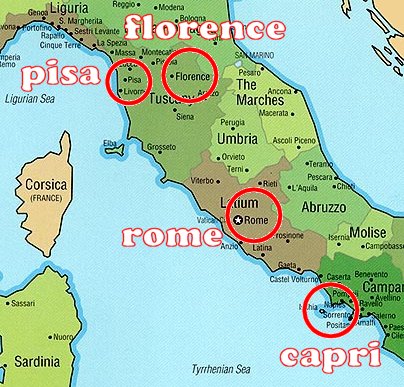 |
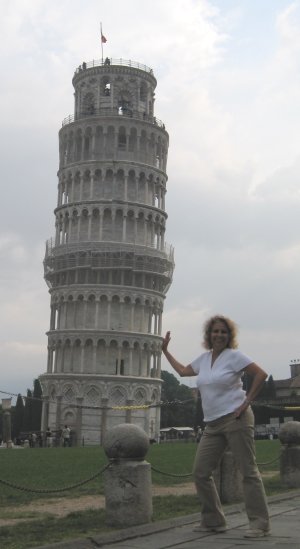 |
THE
LEANING TOWER OF PISA
The final blow
to the dignity of the Pisans came from the famous
Leaning Tower of Pisa. This
beautiful
freestanding bell tower was
obviously
intended to stand vertical, but
the tower began leaning soon after the onset of construction
in 1173. The cause was a poorly laid foundation
as well as a loose
substrata that allowed the
foundation to shift direction.
Ever since then, the Leaning Tower of Pisa has become
the world's biggest laughingstock. The Leaning
Tower is quite literally the world's leading symbol for bad
architecture. It is sad in a way to see such an ignoble end
come to such an impressive structure.
What makes the Tower so interesting,
however, is that it doesn't fall. There are
plenty of other examples of bad architecture. For
example, Europe has a dozen cathedrals that fell down, but
we don't hear about them because they all got rebuilt.
Not the Leaning Tower. Nine centuries have
passed and the darn thing is still standing.
The tower began
to sink after construction had progressed to the third floor
in 1178. This was due to a mere three-meter foundation, set
in weak, unstable subsoil, a design that was flawed from the
beginning. Construction was subsequently halted for almost a
century, because the Pisans were almost continually engaged
in battles with Genoa, Lucca and Florence. This allowed time
for the underlying soil to settle. Otherwise, the tower
would almost certainly have toppled.
In 1272, construction resumed under Giovanni di Simone. In
an effort to compensate for the tilt, the engineers built
upper floors with one side taller than the other. This made
the tower begin to lean in the other direction!
Because of this, the tower is actually curved. Construction
was halted again in 1284, when the Pisans were defeated by
the Genoans in the ill-fated Battle of Meloria.
Since the Battle of Meloria was basically the beginning of
the end for Pisa, the sad fate of the tower seems to oddly
parallel the sad fate of the city. Even the famous
story of native son Galileo using the tower to demonstrate
the powers of gravity turned out to be nonsensical folklore.
That event never happened. However, I imagine today's
populace probably doesn't mind the jokes. The lemon
makes lemonade. Without their
famous Leaning Tower, Pisa would have become another obscure
Italian cathedral town long forgotten in the world's eye.
In the late
twentieth century, an alarm was raised that the Tower was in
great danger of actually toppling over. The
tower leaned at the precarious angle of 5.5 degrees
and the problem was getting worse. Restoration
work performed between 1990 and 2001
corrected the lean to about 4
degrees. Today, thanks to the determined
work of thousands of tourists like Marla who show up daily
to help hold it up, the Tower seems
ready to survive for some time to come.
|
|
 |
FLORENCE
Florence is
famous for its marvelous art museums. Most art
historians
consider Florence to be the epicenter of the Renaissance
Era. Many important works of art are housed right here
in Florence. For example, David, the marvelous
Michelangelo sculpture, resides at
Galleria dell'Accademia.
Naturally the chance to visit Florence was a
definite highlight for many people in our group.
For our day in
Florence, Marla arranged a private tour for our group with a company that
offers shore excursions. This was an experiment on
Marla's part. Marla figured if enough people were
interested in going together, she could beat the cruise
line's price for the same trip. Marla was right. She was able to
negotiate a price that beat the same tour
offered by the cruise line for $180 less per person.
This was another wonderful example of the advantages of
having a large group.
Nevertheless, Marla was worried. She was taking a
gamble.
The cruise tour had two major advantages over Marla's tour... one, the ship
promised to wait for the bus if it was late... two, they had
experienced tour guides who could deliver the goods. Marla's price,
on the other hand, was hard to beat. In addition, the
thought of having a tour strictly for our own group was very
attractive. Thanks to the good price and the
exclusivity, Marla had a large group of forty people
sign up.
Marla's gamble was by
and large a success story, but there was definitely room for
improvement. The first headache was that our promised
trip to the important Uffizi Museum was left off the
itinerary. The company had guaranteed this visit as
part of the package, but Marco, the tour guide, had not been
told (or so he said). Marla had no way of knowing whom to
blame for the mix-up, but she wasn't going to back down.
Once Marla presented the document from the company proving
their promise to deliver Uffizi, Marco's wife phoned ahead
and got us reservations at the Uffizi Museum.
The problem was
that the entrance price was 10 euros per person. Marla
and I had to ask people to contribute their own money in
order to raise the necessary cash. It was was awkward,
but it all worked out. One month after the
trip was completed, the tour agency refunded Marla the
money, then Marla passed on the refund to each individual who had
loaned us money that afternoon.
|
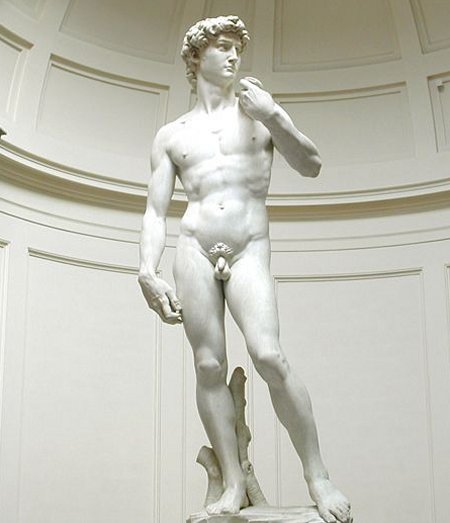 |
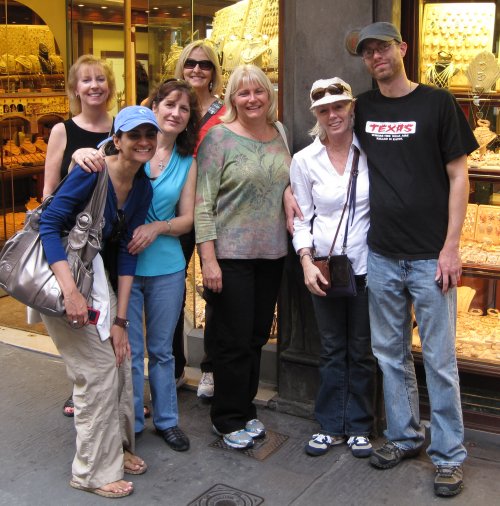 |
Our next problem was caused by a weak guide.
Marco felt that a group of forty people was unmanageable in
the museum. Marco invited a buddy to meet us and help
him conduct the tour. Marco split us up into two
groups. I don't remember the name of the
other guide since I wasn't in his group, but I
do know he wasn't very well received.
The man was long-winded plus he wasted a lot of valuable time on
side trips that his group wasn't interested in. In
other words, he didn't listen. Marla
caught some flak from several unhappy members of our group.
The other
problem was that our time at the Uffizi Museum was rushed.
Thanks to the mix-up, some of our limited time had been
wasted in Pisa and could not be completely salvaged.
We ended up giving up our lunch hour to go see this museum
but it still wasn't enough.
I was heart-broken to see our time at the museum cut so
short. This wonderful art gallery possessed some
truly remarkable paintings. I could have spent all day
here and been completely happy.
However, there
were many other things in Florence to see so I decided to be a good sport
about it and not raise a fuss. In addition to the
Galleria dell'Accademia
and the Uffizi Museum, we visited the
Santa Maria del Fiore Cathedral, a giant
structure which is the fourth largest church in Europe. We
also saw the Ponte Vecchio, the famous bridge
which spans the Arno River.
Another highlight of our day was visiting the amazing
Piazza della Signoria, a huge town square which is
the focal point of Florence. The Piazza della
Signoria contains perfect outdoor replicas of many famous
statues, including David as well as the
Rape of the Sabine Women (see picture below).
Visiting the
amazing museums and seeing the sculptures in this
historic town square made it quite clear to me why people consider
Florence to be the cradle of the Renaissance.
|
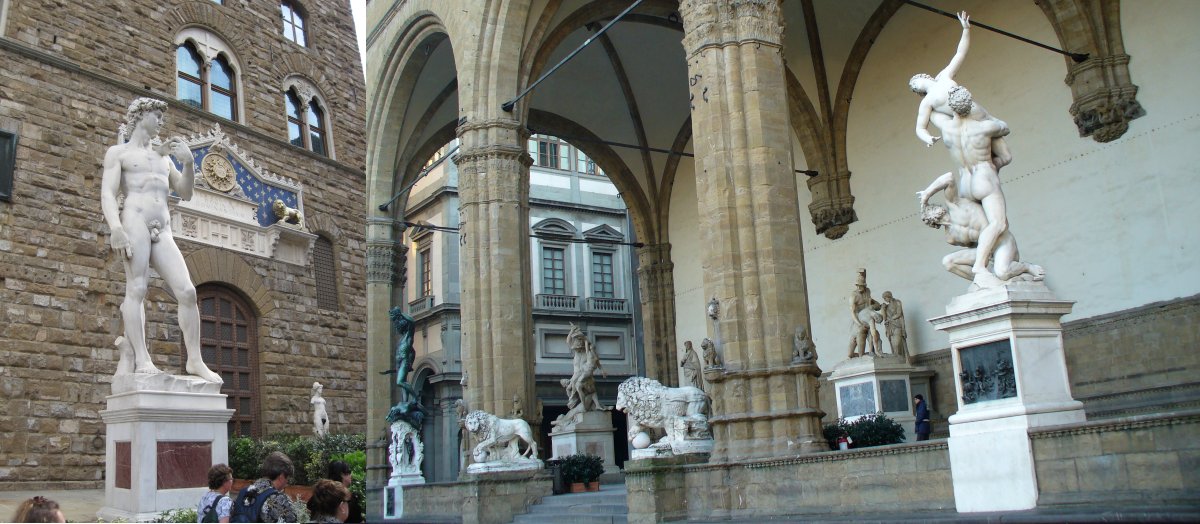
The Piazza della
Signoria contains perfect replicas of many famous
statues, including David as well as the
Rape of the Sabine Women |
| |
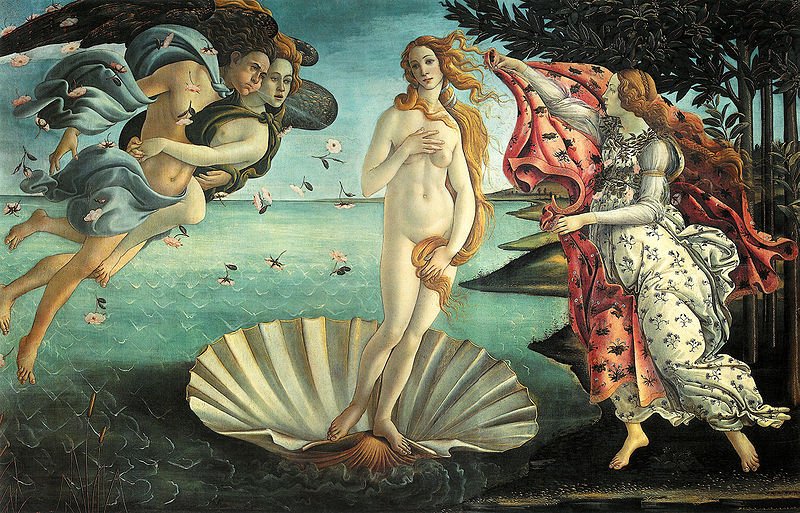 |
The Birth of Venus, by Botticelli,
as seen at the Uffizi Gallery in Florence
I love this painting.
I could have stood there staring at it all day if they let.
|
| |
|
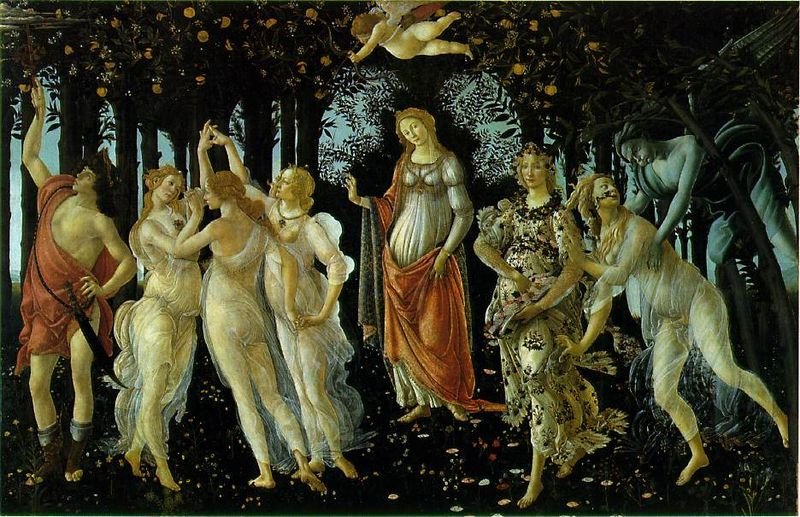 |
Primavera,
by Botticelli,
as seen at the Uffizi Gallery in Florence.
Another one of my
favorites. |
| |
|
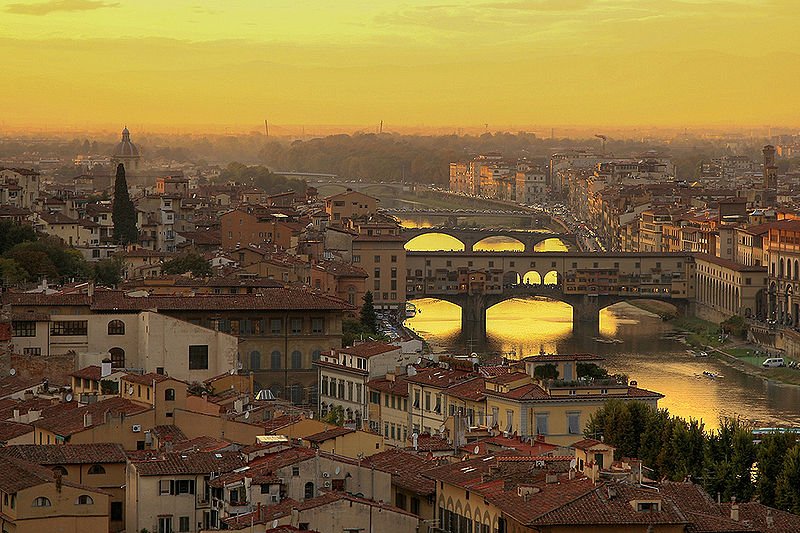
The famous Ponte
Vecchio bridge that spans the Arno River |
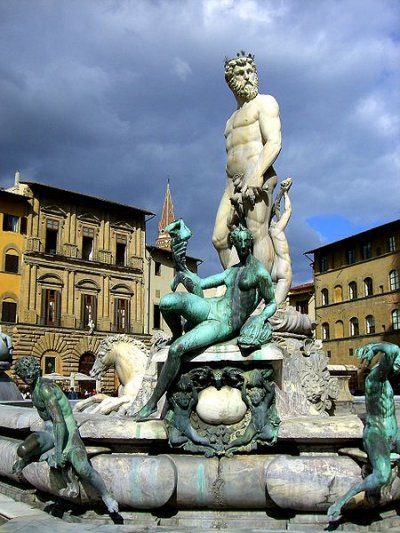
The
Statue of Neptune in the
Piazza della Signoria |
| |
|
|
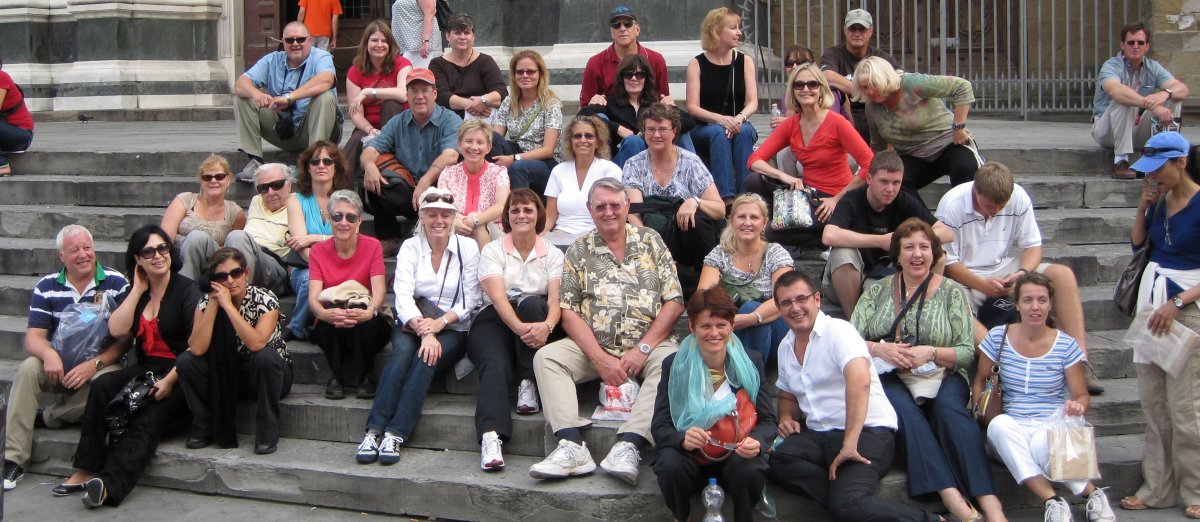
This picture has about 30 of our 40 group members. That is
Marco in the white shirt with his wife Annamicah (red purse) down
in front. |
|
|
I
do remember Marla was very stressed throughout the day.
For starters, she was worried that the guide and the bus
wouldn't even show up.
Then Marla nearly had a heart attack when she found out we
weren't going to see the Uffizi Museum. She had
promised everyone we were going there! Fortunately we
were able to rescue that situation, but it still took quite
a toll on Marla's nerves. She knew people were
depending on her to organize this trip well, so every little
complaint cut deep into her psyche.
Marla was also worried that the guide would turn out to be
boring. Unfortunately, she was half-right on this
fear. It was a shame that one of our tour guides was
mediocre. Getting poor tour guides happens
more often than some people realize. For example, some
people in our group who chose to book their excursion
through the ship weren't totally pleased with their tour
guides either. We expect all
tour guides to be excellent. However, now that I think
about it,
in all my trips over the years I can only recall a few
people who were truly remarkable.
We had one lady walk us through the Borghese Museum in Rome
back in 2008 who was very good. However the jerk who
did the Colosseum Tour in the same afternoon was awful. We
had a very knowledgeable man walk us through a waterfall
tour on the Big Island during our 2007 Hawaii Trip.
However, the
guy who took us to the Lava Fields the previous day
wasted hours taking us on side trips so his cronies could
make money off of us. I also remember
a highly-entertaining maniac who delighted in getting us soaking wet in Bay
of Fundy during our 2006 New England Trip. However, a
day later on our trip to the White Mountains in New Hampshire,
our tour guide
wouldn't even stop the bus to let us take pictures of the
magnificent scenery. So there's a lot of bad mixed in
with the good.
After sixteen different cruise trips, most of the guides I
have come across have either been average or much worse. So
maybe we should count our blessings that at least one of
guides today, Marco, was pretty good. Of course that
is no consolation to the twenty people who got stuck with
Marco's buddy for a couple hours. Once they saw the
difference in the two leaders, several people snuck back
into Marco's group. If Marla and I learned one thing,
it would be to insist on getting what our group wanted to
do, not what the guides preferred to have us do.
I can't speak for everyone, but I loved our trip to
Florence. The chance to see David as
well as the statues in the square and my favorite Botticelli
paintings made the entire day worthwhile to me. By and
large, our trip to Pisa and Florence went well.
|
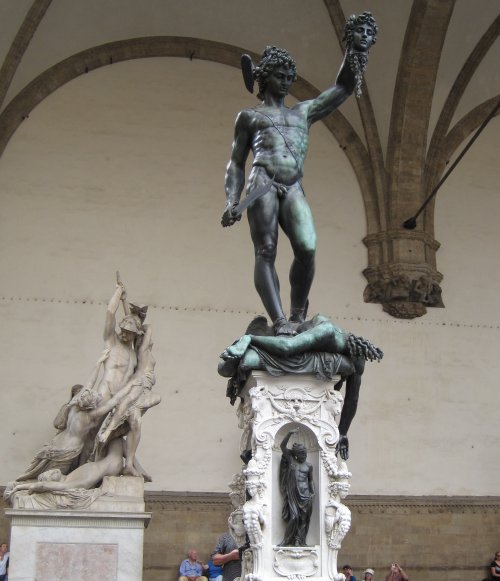
Perseus holding Medusa's Head, by Cellini,
another famous replica
that can be seen in the Piazza della
Signoria |
|